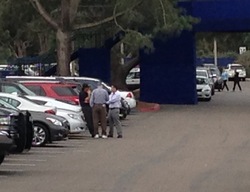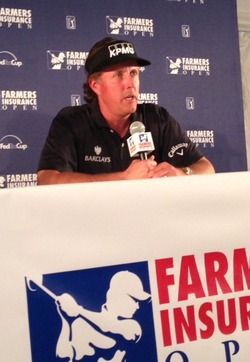Phil Finally Speaks, Finally: Tax Preparation, State Of California & Winged Foot Lay-up Edition
/Unaware that he was keeping the media from enjoying National University Golf Academy's soft taco-sponsored and prepared (by-chef-Andrew Bard) lunch, Phil Mickelson spent nearly an hour in the Torrey Pines parking lot either...
(A) trying to pry loose his Journey greatest hits CD lodged in the car player.
(B) regrouping after his 5 hour pro-am round by showing PR man T.R. Reinman how to use TurboTax
(C) plotting how he would best defuse the uproar over his tax policy remarks and ensuing apology.
 For the answer, let's go to the transcript...but judging by the quality of his analogy, the time was well spent.
For the answer, let's go to the transcript...but judging by the quality of his analogy, the time was well spent.
Q. Phil, what have the last 72 hours been like for you?
PHIL MICKELSON: Interesting (smiling).
Q. Could you elaborate?
PHIL MICKELSON: Karen, this reminds me a lot of Winged Foot in 2006, where I hit a drive way left off the tents. So this happened to be way right, but way off the tents. You know, I've made some dumb, dumb mistakes, and, obviously, talking about this stuff was one of them.
Like Winged Foot, where I tried to carve a 3‑iron around a tree and get it up by the green, I make double bogey and lose the U.S. Open, I think I'm going to learn my lesson and take a wedge and get it back in play.
I made a big mistake talking about this stuff publicly, and I shouldn't have done that.
Q. You said you took that wedge and hit it the wrong way. But, in reality, you didn't say anything wrong. You just said things that you feel. Do you feel it's unfair that there are people out there attacking you for something you said that isn't technically wrong, in fact, it's quite technically correct.
PHIL MICKELSON: My apology is for talking about it publicly, because I shouldn't take advantage of the forum that I have as a professional golfer to try to ignite change over these issues.
I should have talked about ‑‑ because I don't have a plan formulated yet on what I'm going to do. And when I do come up with a plan, and Amy and I have talked about it, and we've been working through this for a while, and I'll be able to talk more about it publicly then. But I shouldn't have brought it up publicly and used this platform as a way to say what I had to say.
And then...
Q. I'm curious from the statement that went out Monday night, what triggered your thinking that I need to address this now and say what you did Monday night?
PHIL MICKELSON: I think that it was insensitive to talk about it publicly to those people who are not able to find a job, that are struggling paycheck to paycheck. I think that was insensitive to discuss it in that forum. So that's why I issued a statement, because I shouldn't have brought it up at all, and I didn't want to wait until today.
Regarding the Padres…
Q. But at the end of the day, was it something that you wanted that you couldn't fulfill, or is it something that you weren't sure about and decided not to do?
PHIL MICKELSON: I just didn't feel I was able to commit to being a part of the community at the time.
Regarding California...
Q. Here, in your statement, you've said it's a private decision and something that you and your family need to discuss, and ultimately whatever decisions are made will be made by you and your family. But to what extent are you sharing with others your situation, and are you hearing similar circumstances for those who you associate, friends, neighbors, that kind of thing?
PHIL MICKELSON: We have talked and will continue to talk to the best tax advisors and what have you. I've certainly ‑‑ well, I love this state. I grew up here. I love it here, and I'm certainly concerned for it.
 On the anchoring debate, this was interesting with regards to the Tour making its own rules:
On the anchoring debate, this was interesting with regards to the Tour making its own rules:
PHIL MICKELSON: First off, I think that the athletes should not be making the rules. The PGA TOUR should not be making the rules. We need an independent entity. I remember a conversation I had years ago with the commissioner about this, and it made perfect sense to me, that we have such varying views on things that to try to make rules internally that would be favoring some and not others as the wrong way to go about it, and we need to have an independent organization, in this case, the USGA and/or R&A as our governing bodies making the rules. We should not interfere. I do agree with that.
But as far as the anchoring, I have very mixed feelings on this. Because, although I feel that anchoring should not be part of a golf stroke, it was allowed 30‑some‑odd years ago and should not be taken away.
I feel that from studies I've heard of, specifically from Dave Pelz and his schools, that it's potentially half a million to a million golfers who would be so embarrassed at this inability to make a three‑foot putt with a regular putter that they may quit the game. And I care about the game. I want the game to succeed, and I don't want that to happen.I feel it's unfair for the players that have been putting that way for quite some time with the understanding that it was legal. So I have very mixed feelings about that. It should not have been allowed 30 years ago, but once it was allowed, I don't know how you change it.
On the North Course redo:
PHIL MICKELSON: We've been out on the course quite some time, spent a lot of time coming up with plans on each holes. In fact, three holes are out there, pictures and remnants of what it will look like. But I have very strong opinions on golf course architecture because I want to promote the game. And this is a perfect opportunity for me to present my thoughts, which is, we need to have parameters left and right, not front and back. We need to give the ground an opportunity for the player to run the ball on to the green. We can't have these forced carries.
The Torrey North project is an awesome project too because there's been so much grass put in that separates the holes from the canyon that we'll be able to bring some of that canyon element, that environment, that sand, and bring it back into the golf course and make you feel like you're part of the canyon. That it's right there. Still being playable, still being able to find your ball, but getting rid of acres of grass which would ultimately lower maintenance costs and lower water costs quite a bit.
And I think it would make the golf course with the same green fees much more profitable than it currently is.
And back to the taxes issue, it seems something has changed for him.
Q. Back to the taxes. I think you expressed something a lot of people feel. Nobody likes to pay their taxes. I'm just curious when you're faced with a huge tax bill, what does that feel like for you?
PHIL MICKELSON: Well, I love this country, and I love the opportunities that it's afforded me to be successful and to do what I love. So I've never had a problem with that before. I've never had a problem paying my fair share, because I know there are very few countries in the world that let you do what you do and live in this environment and have your personal possessions be secured through the court systems, through the police, through all the many things that this country offers. So I've never had a problem with that before.
Q. But you do now?
PHIL MICKELSON: I've never had a problem paying my fair share. I don't know what that is right now, but I've never had a problem paying my fair share.
And the closer...
Q. Did you get any "What were you thinkings?"
PHIL MICKELSON: Only from me and my family, coach, D.R., a bunch of emails, yeah. Of course I got "What were you thinking," absolutely. Myself, sure. Thanks, guys.
**Randall Mell says Phil "got himself up and down from a public relations mess."
Ron Sirak agreed that the apology was well done, but still has questions about what prompted the remarks:
No matter what you feel about taxes, the complaints were coming from a guy who is left with tens of millions of dollars AFTER meeting his obligations to local, state and federal governments. With millions still jobless in the painfully slow recovery from The Great Recession, many found Mickelson's comments self-serving, selfish and frightfully not self-aware. Clearly, by Wednesday he was aware of that.
Doug Ferguson's AP story with ESPN Sportscenter clips of the press conference.











